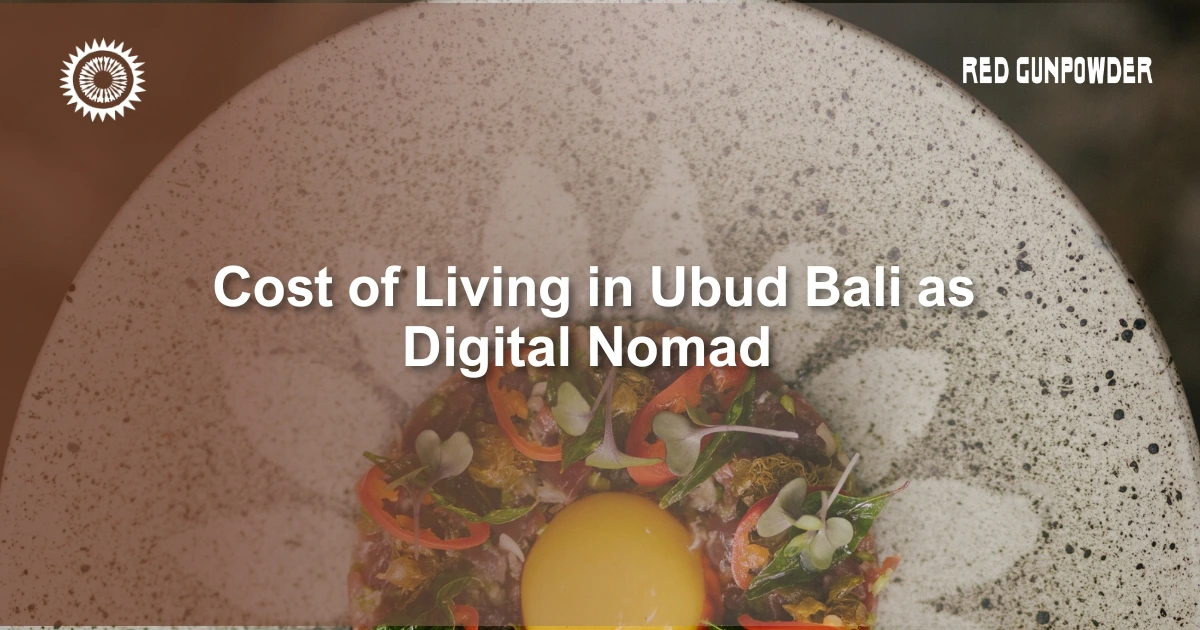Most people think of Bali in terms of Seminyak’s nightlife or Canggu’s beach clubs, but Ubud offers a completely different rhythm of life. Nestled in the jungle and surrounded by rice terraces, Ubud has become a favorite escape for those seeking culture, wellness, and a slower pace. Instead of sunsets by the beach, here you wake up to temple chants and the sound of roosters. That contrast is exactly what drew me to spend more time here — and it made me curious about the real cost of living in Ubud compared to Bali’s coastal hotspots.
Ubud is known as Bali’s cultural and wellness hub, but living here can be as affordable or as indulgent as you want it to be. From yoga classes and vegan cafes to private villas and co-working spaces, the options vary widely depending on your lifestyle. After months of living in Ubud and comparing local prices, I have a clear idea of how much it actually costs to settle down here.
Table of Contents
ToggleHousing and Accommodation
Accommodation is usually the biggest monthly expense. Ubud has options for every budget. A simple local homestay room can start at around 3 to 5 million IDR per month, which is about 200 to 330 USD, often including breakfast and cleaning. For something more private, a one-bedroom villa with a pool in the outskirts might cost 8 to 15 million IDR monthly, depending on the location and amenities. Long-term rentals usually offer better rates than nightly bookings on platforms like Airbnb. I found that negotiating directly with owners for stays of three months or more can save a significant amount of money.
Read also : The Real Cost of Living in Bali: Can You Live on $1000 a Month?
Food and Dining
Food costs depend on whether you eat like a local or prefer international-style restaurants. Local warungs serve hearty meals such as nasi campur or mie goreng for 20,000 to 40,000 IDR, roughly 1.50 to 3 USD. Eating at cafes that cater to expats and tourists usually ranges from 70,000 to 150,000 IDR per meal, or 5 to 10 USD. A smoothie bowl and coffee in a trendy Ubud cafe often cost the same as an entire meal at a warung. Cooking at home is possible too, though imported groceries at supermarkets like Coco or Pepito can be more expensive than expected. Fresh fruit, vegetables, and spices from the local market are much cheaper and give you a taste of authentic Balinese flavors.
Transportation
Ubud does not have public buses or trains, so most people get around by motorbike. Monthly rentals for a scooter range from 800,000 to 1.5 million IDR, or 55 to 100 USD, depending on the model. Fuel is very affordable, usually less than 1 USD per liter. If you prefer not to drive, Grab and Gojek ride-hailing apps are available, but costs can add up if you use them daily. A car with a driver is a convenient option for day trips outside of Ubud and usually costs around 600,000 to 800,000 IDR per day.
Co-working and Internet
Since many people come to Ubud to work remotely, co-working spaces are an important part of living here. Popular spaces like Hubud, Outpost, and Beluna charge between 2 and 3.5 million IDR per month, depending on the package. These memberships usually include fast Wi-Fi, community events, and comfortable work areas. If you prefer working from cafes, most provide free Wi-Fi as long as you order food or drinks. Mobile data is cheap too, with SIM cards from providers like Telkomsel or XL costing about 100,000 IDR for several gigabytes of data.
Wellness and Lifestyle
Ubud is known as Bali’s wellness capital, and many people budget for yoga, meditation, and spa treatments. Drop-in yoga classes usually cost around 120,000 to 150,000 IDR, or about 8 to 10 USD, while monthly packages bring the price down. Spa treatments such as a one-hour Balinese massage range from 150,000 to 250,000 IDR, much cheaper than in most Western countries. Entertainment such as cultural performances at Ubud Palace cost around 100,000 IDR per ticket, making them accessible even on a modest budget.
Read also : Is Bali Very Expensive? A Detailed Look at Costs and Affordability
Daily Expenses
Other daily costs like laundry, coffee, or small essentials are affordable. Laundry services typically charge 10,000 to 15,000 IDR per kilogram, which is just about 1 USD. A cappuccino in a cafe ranges from 30,000 to 50,000 IDR, or 2 to 3.50 USD. Gym memberships vary, but smaller gyms start at around 500,000 IDR per month. Many digital nomads also invest in health insurance or international travel insurance, which is worth including in your budget.
Final Thoughts
For me, Ubud strikes the right balance between affordability and quality of life. It is possible to live comfortably on a modest budget if you embrace the local way of life, or you can enjoy a more luxurious experience if you are willing to spend more. This flexibility is one of the reasons so many digital nomads and long-term travelers are drawn to Ubud. The cost of living is not only lower than in many Western countries, but the lifestyle it offers, surrounded by nature, culture, and a vibrant community, makes it worth every rupiah.






